Editor's Comment: The following report is the 4th and final report in the series, "Libya One Year After" by Axis of Logic Columnist, T.J. Coles. We thank him for establishing a fully documented and accurate history of NATO's destruction of Libya 2011. Read Parts I, II and III of this important series that exposes the deceptive foundation provided by the invader for their war on the people of Libya. If you haven't already done so, read T.J. Cole's first three reports in this important series:
- One Year On. Why we attacked Libya
- Libya: One Year On (Part 2): Recording NATO's War Crimes
- Libya One Year On (Part 3): The Propaganda and the Law
- Les Blough, Editor
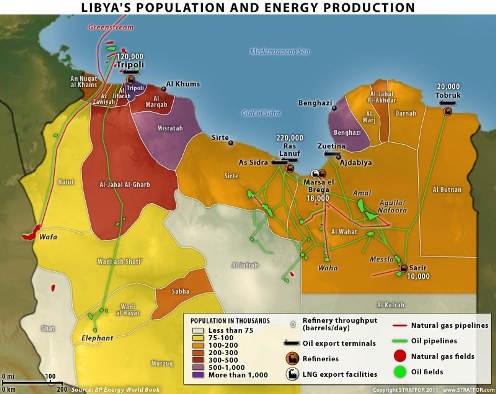 |
In the mid 1990s, the British secret services sought to depose Muammar Gaddafi by working with their mujahideen terrorist allies, the Libyan Islamic Fighting Group (LIFG), whose members they had trained in Afghanistan in the 1980s.1 Gaddafi defeated the LIFG, jailing its leaders and launching attacks against LIFG bases. Gaddafi, fearing a coup, sought rapprochement with Britain. In 2000, Oil Diplomacy quoted Gaddafi as saying: “Libya wants to encourage foreign capital investment and partnership, not only for the benefit of this country but for the entire African continent to which Libya is the gateway for Europe.”2
At that point, MI6 betrayed the LIFG and began working closely with Gaddafi’s regime.3 MI6 and the CIA even helped Gaddafi to capture LIFG leader Abdel Hakim Belhadj, who “said that he was tortured by CIA agents before being transferred to Libya.”4 History repeats. In the twelfth century, the Order of the Knights Templar received contract to plunder what is now Libya. By the early thirteenth century, the Templar had accumulated too much personal wealth and influence. Consequently, the Pope, Philip IV and Edward II had many of the Knights Templar arrested and tortured.5 In the world of power and greed, friends and allies change and disappear as quickly as the wind.
More Blood for Oil
From 2004 to around 2009, numerous business-linked politicians courted Gaddafi publicly. They included Tony Blair, working on behalf of Shell, BP, and JP Morgan;6 then-Foreign Secretary and European Council on Foreign Relations member David Miliband; and Neil Kinnock MP. The latter “discussed Shell’s business in the region and helped promote the UK’s wider energy agenda,” the Guardian reported, adding that “British oil interests got its second major boost in Libya … when BP won rights for exploration and development work there.”7
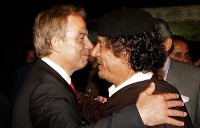 |
| Tony Blair courting Col. Qaddafi in Tripoli for oil and gas in 2007 |
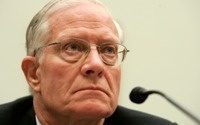 |
| Pro-war Anthony Cordesman on Libya in 2011 |
NATO stated that “65 per cent of the oil and natural gas consumed in Western Europe passes through the Mediterranean each year, with major pipelines connecting Libya to Italy and Morocco to Spain.” NATO’s statement concluded that “Since October 2001 NATO ships have been patrolling in the Eastern Mediterranean.”12
| David Miliband in March, 2011 complaining that Qadaffi's son, Saif was permitted to give a talk at London School of Economics in May, 2010 |
Libya and the BMENAI
More than just the energy issue, however, is Libya’s role in the Broader Middle East and North Africa Initiative. After the collapse of the rival Soviet Union in 1991, Europe began an economic liberalisation scheme for North Africa titled the Mediterranean Neighbourhood Policy.15 The goals were to end the region’s unemployment and to close the “gateway” to Europe for Sub-Saharan African refugees. Both reasons had to do with preventing immigration to Europe.16 Around the same time, the US concocted a similar scheme involving broader economic liberalisation (the Greater Middle East project).17
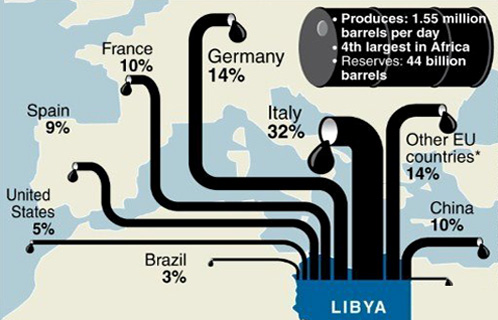 |
The west salivates over Libya's oil and gas.
|
In 2004, the Libyan-British Business Council was established, providing a forum for some one-hundred-fifty companies, including Shell, BP, Barclays, HSBC, and BAE Systems. Its aims are “to maintain a favourable business climate and minimise bilateral difficulties” in order to “overcome common barriers to market entry … [b]y acting as an influential and informed advocacy group on behalf of UK business in Libya.”20
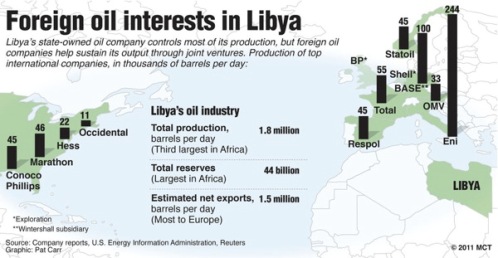 |
Foreign oil companies chafing at the bit
to safely extract oil from Libyan oil fields. |
"hydrocarbon wealth has made Libya, on a per capita basis, one of richest countries in Africa. … [I]t is understood that the country has very limited external debts. … [A]ll citizens have free access to a generous package of health care … [However, t]he EC strategy has one overarching objective: to consolidate Libya’s integration in the rules-based international political and economic system."21The “rules-based” system means compliance with Full Spectrum Dominance22 in the New World Order.23 The EC demanded:
"a deep and comprehensive free trade area (FTA) to cover trade in goods and services, investment issues and other key trade rules (intellectual property rights, competition, public procurement, trade and sustainable development, sanitary and phyto-sanitary rules, statistics, customs, and trade facilitation)[,] … as well as [discussing] many sectoral issues, in particular energy, transport, environment, industrial and enterprise policy, tourism and cultural heritage, agriculture and rural development, fisheries and an integrated approach to maritime affairs, including maritime governance, science and technology, education and training, etc. … Libya needs to adopt modern administrative and management techniques."24In other words, the powers that be had planned for a full corporate takeover of Libya, and their well-funded propaganda machine tried to convince their Western domestic publics that NATO was acting as a guardian of human rights.
A Thorn in Their Side
The largely consolidated Euro-American business interests had a problem. Like Mubarak, Ben Ali, and Assad, Gaddafi would not fully comply. As a result, CNN put out vulgar propaganda, claiming that the former leaders of the Libyan Islamic Fighting Group, whom they admitted had links with the mujahideen (“al-Qaeda”), had renounced terrorism. Plan B was to work with those former leaders in order to overthrow Gaddafi. However, as the mujahideen (“al-Qaeda”) were blamed for the 9/11 atrocity, any future overt association between the US and the LIFG would outrage many Americans (hence the pretence that the LIFG members had renounced violence).25
The business world’s fears were realised: Gaddafi would not fully comply with the liberalisation demands. The energy company-sponsored International Crisis Group noted that the reform constitution “never saw the light, reportedly because Qaddafi rejected it, claiming it tampered with the fundamentals of the Jamahiriya,” Gaddafi’s socioeconomic system. “[T]he reform process was highly orchestrated, in effect an affair of marginal and cosmetic rather than radical or wholesale changes.”26
A report into Gaddafi’s non-compliance found that Libya’s National Oil Company “fell short of its mandate to promote investment in Libya by international oil companies including PetroCanada, RWE, Wintershall, Shell and Eni”, Reuters reported. “It says many of these firms stopped or reduced exploration and surveying activities in the country in the first half of 2010.”27 The Libyan-British Business Council, which by its own admission had maintained links with Gaddafi’s opponents in case they had to switch sides, wrote that
Foreign investors and other firms doing business in Libya continued to experience significant challenges: slow and arbitrary decision making, late or incomplete payments and an absence of transparency and predictability. The most business-friendly legal reforms were not introduced until 2009 and 2010 and even then, the IMF expressed doubts about their status.28
In 2010, the US State Department began training Libyan dissidents in how to efficiently use the internet to provoke unrest.29 According to the ICG, anti-Gaddafi Libyans living in Britain also began mounting an internet campaign to encourage anti-Gaddafi elements in Benghazi to rise up. At that time, MI6 switched sides again and began training and arming the anti-Gaddafi rebels, whom, re-enacting the 1995-6 coup attempt, hijacked the Arab Spring and sought to depose Gaddafi.30
The most conclusive evidence that the coup was planned long ago came from the UK Foreign Office in March 2011, which commented on the “1.86 billion Libyan dinar bank notes that were printed in the UK before the current crisis.”31 Likewise, then-Defence Secretary Liam Fox said that “None of the self-professed experts whom I have been able to talk to predicted Tunisia or Egypt, or the speed of what has happened in Syria or Libya” (emphasis added).32
So, Libya and Syria were predicted (because Fox must have known about the secret service’s presence there), but not the “speed” of the takeover. As noted elsewhere, UK Special Forces have also been arming and training the opposition in Syria since at least November 2011.33
Also noted are the US plans dating back to 2004 to foster internal revolution in the Middle East and steer events to outcomes favourable to US interests (i.e. getting rid of Mubarak but not the Egyptian Army, etc).34 There is a major difference between Syria and Libya, however: Syria does not have substantial reserves of oil, so NATO will not attack it.
With NATO’s help, the anti-Gaddafi rebels raped, pillaged, bombed, shot, and destroyed most of Libya, ethnically cleansing black Libyans with MI6 and SAS training and weaponry.35 At the time of the insurrection, Robin Lamb, Director-general of the LBBC wrote that the rebels “are more rather than less likely to welcome an increased role for the private sector.” The quid pro quo was: you do what we say and we’ll get you into Office.36
Opened for Business
Within ten days of the NATO bombing, a business meeting convened in London to discuss Libya’s “transition” to “democracy.” The meeting was attended by, among others, World Bank Senior Counsellor for the UK and Ireland, Andrew Felton.37 Not for the first time, the Security Council became a de facto imperial enforcer. According to the UN Support Mission in Libya (UNSMIL), “A joint World Bank/International Monetary Fund mission to Libya from 13 to 28 January [2012] focused on a macroeconomic overview, public expenditure and public financial management.”38
Like their Labour “opponents” before them, David Cameron’s speechwriters—as NATO bombs were still falling on children—said that of the countries, “Libya is … one of the richest in Africa. Its proven oil reserves are the ninth largest in the world and in relation to their GDP, bigger than Saudi Arabia.” On pulling the strings behind the scenes, Cameron’s speechwriters acknowledged that “Of course there is a role for foreign advice, help and support but we don’t want to see an army of foreign consultants driving around in four by fours giving the impression this is something being done to the Libyans, rather than done by them.”39 As the MoD explained, “perceptions of moral legitimacy” are what count.40
Cameron’s speechwriters added that “we expect the new Libyan authorities to meet their pledge of ensuring transparent and accountable financial systems.”41 The corporate elite are planning a privatisation bonanza. Just some of the British companies descending on Libya include the private healthcare companies Bupa and Keystone, British Water and Biwater, the propaganda agency Bell and Pottinger, Macmillan Education, numerous banks, and drug several companies.42
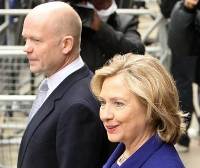 |
| William Hague & Hillary Clinton led support for war on Libya on March 29, 2011 |
Private Finance Initiatives are a New Labour-era scheme in which taxpayers finance corporate investments and corporations reap the profits. Ed Howker and Shiv Malik noted in their study that “Labour’s PFI schemes [amounted to] £56bn, [but] they will cost Britain just a tiny bit more: £267 billion.”45 It doesn’t take too much to imagine what will happen to Libya’s once nearly-debt-free economy.
A year after the coup, as the country lay a smoking ruin, Hague’s speechwriters stated that British firms would be “training workshops for Libyan lawyers” and “provid[ing] support including on preparations for elections and sharing institutional knowledge and expertise with Libyan Ministries.”46 The Tory-Liberal “coalition” should be experts in “democracy promotion”, given that no one in the UK voted for a coalition, that Chatham House acknowledged the results of the election were “inconclusive”, yet Britain still ended up with an unelected “coalition” (around 80% of which is Tory, with a little Liberal thrown in for good measure).



No comments:
Post a Comment